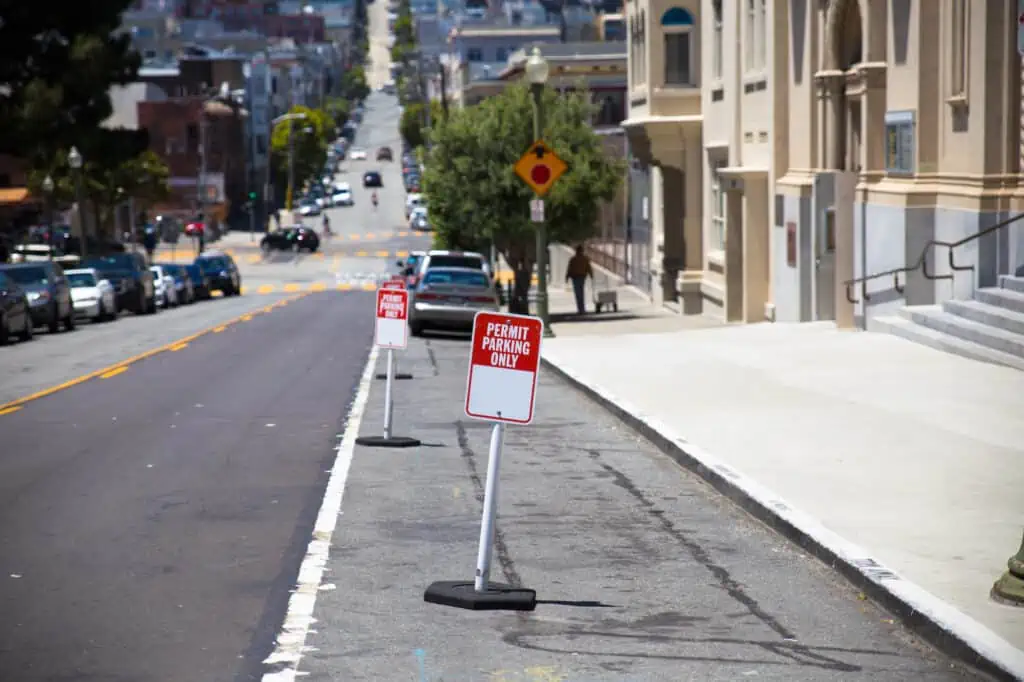A moving permit is official permission from the local government that allows you to park a moving truck legally. It’s usually for a specific day, but it may be longer, depending on the terms.
If you live in a major city where parking permits are required for moving trucks — like Pittsburgh or Chicago — it’s a must to avoid hefty fines. In fact, you should still look into obtaining one if you’re relocating to any city, especially if parking is hard to come by. Getting one can reduce stress and prevent you from wasting time looking for a spot.
And, to make it easy to figure out where to start, here’s our guide that covers the basics, including whether you really need a moving permit, its benefits, and how to get one.
What Is a Parking Permit?

A parking permit grants permission to park a specific vehicle or portable storage unit, usually for 1 or 2 full days, on a future date.You typically have to apply for one at least 3 to 10 days before the project start date, and there’s almost always a charge. Fees can range from $5 to $400, depending on the location.
If you plan to park the moving truck in an area with active metered parking, you may still need to feed the meters. Don’t worry about paying if you’re parking in an area with non-active metered parking. You should always consult with your local authorities for specific regulations.
A parking permit also usually grants the ability to enforce parking at the specified location. If other vehicles park on the date(s) of the permit, you can call the city to have them towed.
You usually have to post temporary “NO PARKING” or “TOW ZONE” signs about 3 days before the job’s start date. Some cities handle the posting themselves, but most require the requester to do it.
Do I Need a Permit for Parking?
Whether you need a parking permit on moving day depends on where you’re moving. Many cities require them, even when there’s usually plenty of parking available. Other places don’t issue them at all. In some locations, it’s optional.
Regardless, you need to create a parking plan. Don’t assume there will be a space to park or that you can double park. Here are a few common scenarios to consider:
- You have a spacious driveway that’s big enough to park a large truck: This is great, but keep in mind that some moving companies avoid parking on private property to prevent potential damage claims. Ask your mover in advance about their policy. If you can use your driveway, then you don’t need a permit.
- You live in a condo or a larger building: Ask building management if there’s a loading dock for your moving vehicle. If so, reserve it in advance.
- No driveway or loading dock is available: Locate the nearest legal street parking and contact your city for a parking permit. Make sure you understand all laws and policies about timing, signage, and procedure.
- You live in a crowded neighborhood: It’s a good idea to get a moving permit. Your neighbors will be more tolerant of interruptions or obstacles if you post official signs before your moving day. Start your new chapter off on the right foot.
- Your new home is in an HOA: The rules and policies for your homeowners association might be different than the municipal ones. You should contact the president or another member of the association to make sure you understand what and how you’re allowed to park in your new neighborhood.
What’s the Benefit of a Moving Permit for Parking?

When you’re moving a home’s worth of furniture and other heavy items, you want your moving truck to be as close to the door as possible. And this is important, even if you’re hiring a mover to do all the heavy lifting for you.
The longer it takes for them to complete the job, the more your movers will charge you. Some movers also charge “long carry” fees (when the distance between your front door and the moving truck is considerably longer than average), which can add up. Save yourself the time and money by taking a few minutes to apply for the permit.
And if you’re thinking you can double park and put on the hazards just like semi-trucks and box trucks do, you could end up paying high fees for multiple parking tickets. Truck drivers often double park for a quick in-and-out delivery, but moving can take hours — sometimes days. Plus, it’s not very neighborly to block traffic.
How to Get a Moving Permit
DIY or not?
One of the issues you might run into when getting a permit is that most cities will have you post the signs a few days before the start date, which isn’t always a convenient option for people moving from out of town.
“The process of getting a moving permit isn’t always clear on a city’s website. Sometimes you have to dig for details, and in some locations, it’s not available at all, so you’ll have to call your city directly.”
For this reason, some people hire a third-party company, such as Permit Puller, to help them secure a permit. Companies like this should know all the ins and outs of getting moving permits in your specific city. They’ll also do all the legwork for you, including posting the “NO PARKING” or “TOW ZONE” signs at your new address, preventing you from having to arrive days earlier just to spend a few minutes hanging up a couple of signs.
Find and fill out your city’s parking permit application

If you decide to go the DIY route, make sure to contact your city well in advance of your move. The application process is rarely quick, so consider obtaining the permit as soon as possible.
First, call the city directly or browse its official government website to determine if it offers moving permits and how to obtain one. Each city’s process is different.
After filling out the online, printed, or hard-copy form, you can either email it, mail it in, or physically bring it to a specific local department. When approved, you’ll receive your “NO PARKING” or “TOW ZONE” signs if you’re responsible for hanging them instead of the city.
So, is going through all this trouble to get the permit worth it? Absolutely! It can help your move go as smoothly as possible and keep you from getting expensive parking tickets or being towed.
Understanding the Parking Permit Process
Parking permit policies can vary, but the basic procedure in most cities is:
- Apply for the permit.
- The city approves the permit.
- Pay the permit fee.
- The city provides a permit document.
- The city provides official “NO PARKING” or “TOW ZONE” signs.
- You (or the city) post signs at the location before the start date.
Beyond these basics, every city operates differently. Here’s a list of some details that can differ from one city to the next:
- Permit name
- The department that issues the permit
- Permit fees
- The number of days in advance you need to secure your permit
- How many days in advance you need to post the signs
- Who posts the signs (whether it’s the city or you)
- The length of time the permit is valid for
How to Get a Moving Permit for Parking, City-by-City
The process of getting a moving permit isn’t always clear on a city’s website. Sometimes you have to dig for details, and in some locations, it’s not available at all, so you’ll have to call your city directly. Let’s take a look at some major locations across the United States and how their moving permit process works.

